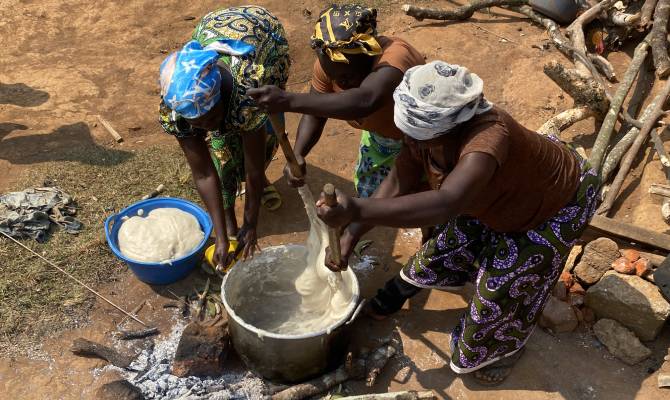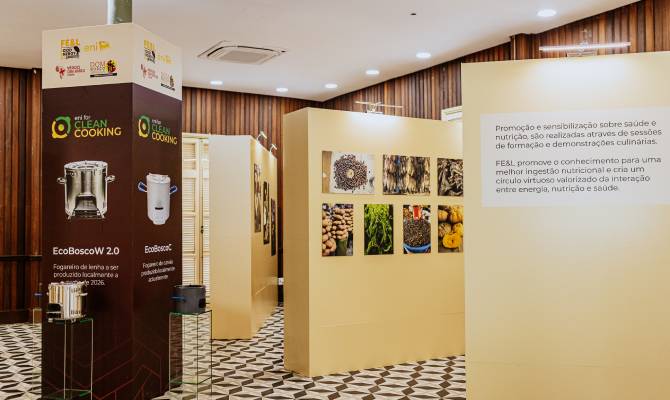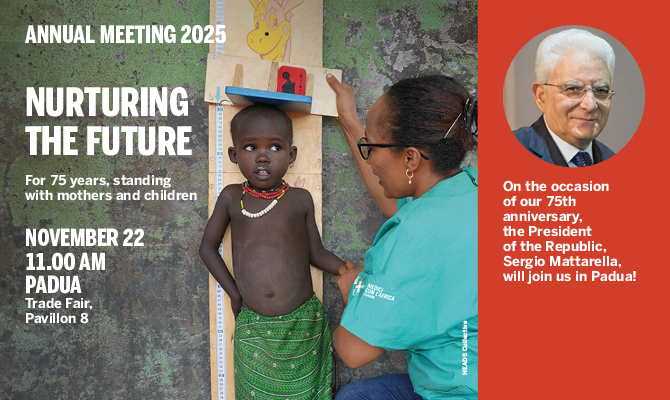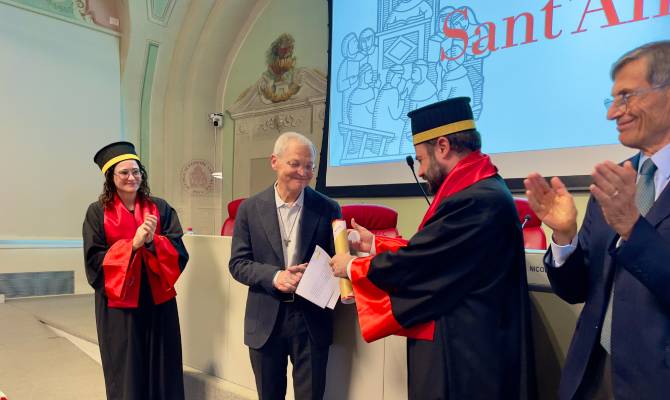Today, hosted at Palazzo Borromeo in Rome, we met with partners, institutions, civil society representatives and the private sector, as well as religious organizations, on the occasion of “Powering Progress: the energy-food-health nexus for sustainable development”.
The event gave us the opportunity to delve into the connection between sustainable energy, nutrition, and health, with particular attention to the most fragile contexts—those where Doctors with Africa CUAMM works every day.
The Italian Ambassador to the Holy See, Francesco di Nitto opened the meeting welcoming both speakers and guests to then leave the floor to the opening remarks by father Dante Carraro – CUAMM Director General; Carlos Alberto Saraiva de Cravalho Fonseca – Ambassador of Angola to the Holy See; Mons. Fortunatus Nwachukwu – Secretary at Dicastery for Evangelization and Alessandra Fidanza – Ministry of Environment and Energy Security.

An introduction that provided participants with a comprehensive overview on the topic spanning from the needs of underserved communities to the importance of bilateral collaboration for mutual development to the ongoing programs promoted by the Italian government.
“I wish to express my gratitude to organizations like CUAMM for the support provided to those most in need—people who suffer due to conflicts, poverty, and human-made hardships. What you do is in perfect harmony with the call of our Holy Father to preserve and protect our common home—the world—for the good of all. Through this, we are also promoting integral human development.” Fortunatus Nwachukwu – Secretary at Dicastery for Evangelization.
“With regards to bilateral cooperation and international cooperation in sub-Saharan Africa, the Ministry of Environment and Energy Security is engaged in the application of the Mattei Plan specifically in the implementation of selected projects on energy and climate that could benefit African countries while also pursuing the implementation of 2030 Agenda” Alessandra Fidanza – Ministry of Environment and Energy Security.
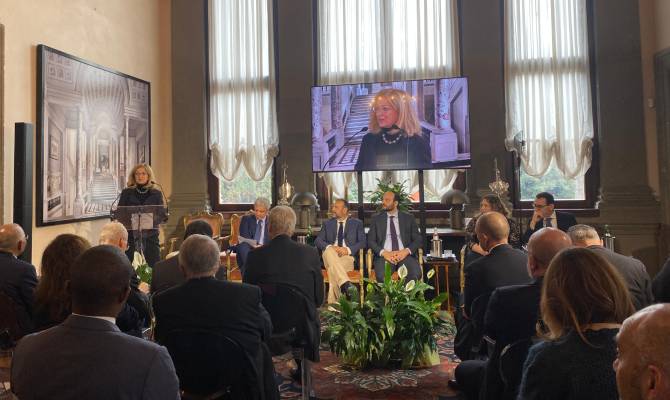
“With the implementation of this project dedicated to facilitating access to clean energy for people in rural areas, we have the opportunity to also promote health practices, which are at the core of our mission. We are doing this by adopting a new approach that also takes into account other health-related aspects, which are equally important for achieving sustainable development.” Father Dante Carraro – CUAMM Director General.
Also a contribution to the event was offered by Domenico Giani, President of Eni Foundation who greeted the participants with a brief speech.
“We must commit ourselves to building a sustainable model—one that, to truly be sustainable, must be able to hold together social justice, respect for creation, and human dignity. As President of the Eni Foundation and of the Confederation of the Misericordia of Italy, I experience every day the dedication of different realities united by a shared sense of responsibility—an effort that is expressed through concrete closeness to people, the nurturing of relationships, and the patient construction of paths of cooperation. In these complex times, it is essential to listen, to build networks, and to create bridges in order to face global challenges and turn them into opportunities for shared growth”. Domenico Giani, President of Eni Foundation
Before moving into the technical panel, a keynote speech by Andrea Marsianich – Head of Carbon Offset Solutions at Eni – provided participants with a detailed overview of the company’s strategy for promoting clean energy solutions, of which Clean Cooking is a key component.
“Our approach to Africa and communities we work with has always been based on collaboration and I like the fact that your name si Doctors with Africa cause “with” is the most important word. As a company, over the years we have also given great attention to cooperating with local institutions, local companies and communities because we want our present to be based on respect, value creation and development of local competencies” Andrea Marsianich – Head of Carbon Offset Solutions, Eni.
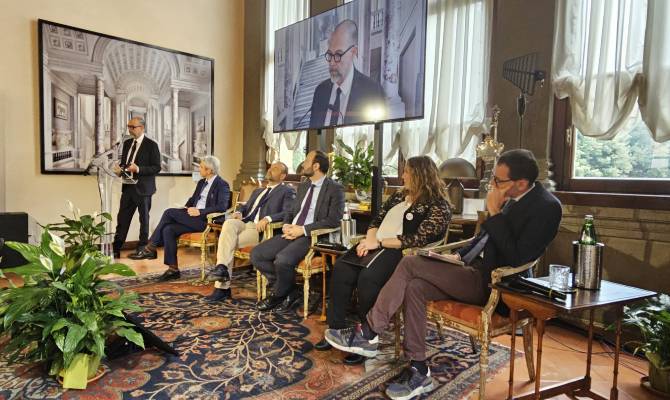
The subsequent technical panel brought together partners such as AVSI, Eni and Solar Barrel to delve deeper into the collaboration opportunities between private sector and civil society for sustainable development in underserved and vulnerable countries.
The conversation highlighted the urgent need for scalable clean cooking technologies and the importance of integrating health-related activities into these efforts. Moreover, the dialogue emphasized the value of engaging faith-based and non-governmental organizations to facilitate community acceptance and promote community ownership, which are key for achieving effective and sustainable results.
“The Clean Cooking project, like other initiatives, is closely aligned with the company’s commitment to working with communities and employees by transferring knowledge and skills. Moreover, we took the opportunity to design the project from a health perspective as well, recognizing the strong connection between energy and health. By doing so, we can offer something more—aligned with our values, mission, and the SDGs.” Simone Mortara, Head of Global Health Competence Center, Eni
“For achieving effective cooperation, we have to look at the human integral development. In that sense the improved cookstove is just a tool that might enable us to design a project for the benefit of communities. That said, I have to highlight the importance of establishing collaborative partnership, as the one we have with Eni” Alessandro Galimberti, Head of Climate Change, Environment and Energy Unit and Corporate Riskm Manager at AVSI
“Sharing best practices, expertise, and knowledge is key to serving a greater purpose—and that’s something we aim to do by transferring our know-how to communities and partnering with the third sector.” Matteo Villa, CEO of Solar Barrel
The dialogue went on with our contribution from Angola—a country where we have been working since 1997 and where we are currently implementing health activities integrated into the clean cooking strategy in rural and semi-urban communities in the northern province of Uíge. Here, we aim to reach around 200,000 households in the most remote areas of a forgotten province, where access to health services is severely limited due also to the long distances to health centers and hospitals.
“As Doctors with Africa, we have soon recognized improved cookstoves as a tool to enter into communities and engage them into wider activities related but not limited to cooking methods. We are talking about the health component which is our expertise. For an effective results, we must not forget community acceptability” Veronica Censi, CUAMM Partnership and Advocacy Manager
To conclude the meeting, emphasis was placed on the key role of faith-based organizations and NGOs which have the potential to facilitate bottom-up change, as they can bridge the technological value brought by the private sector—through partnerships—with their deep knowledge of local contexts. A role to which we remain committed.

